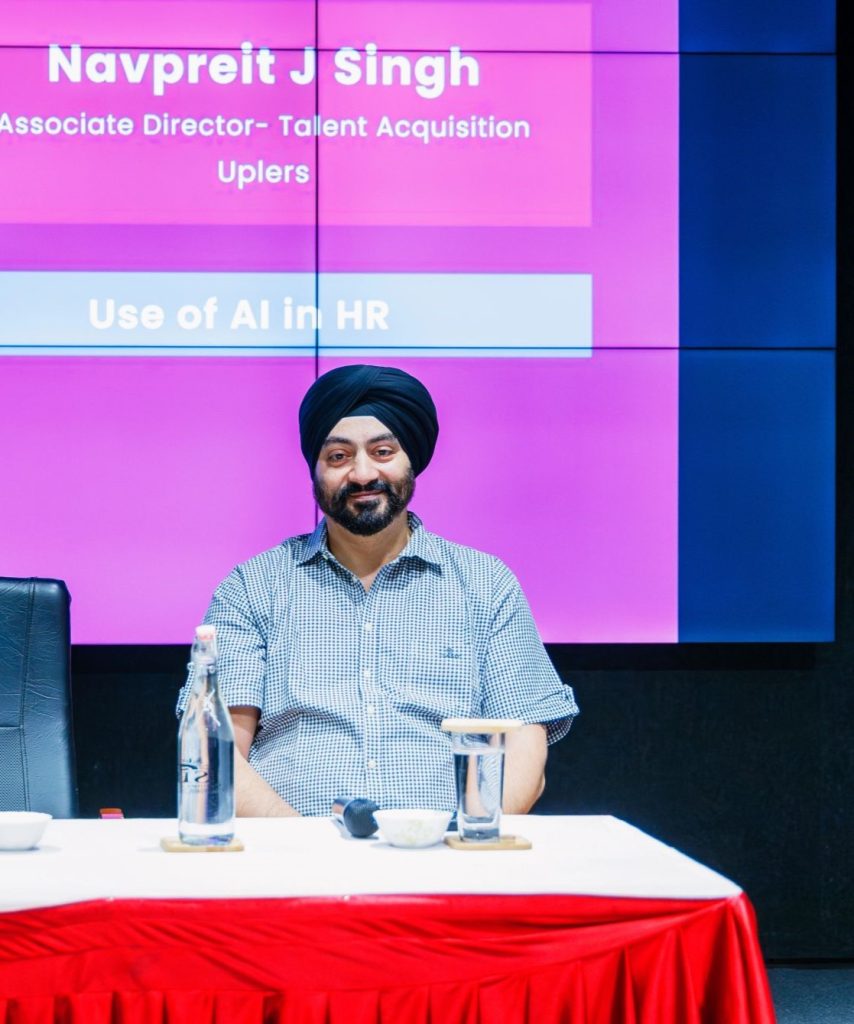In today’s fast-paced business landscape, Artificial Intelligence (AI) is no longer a distant concept but a game-changing force, particularly in Human Resources. Mr. Navpreit Singh, Talent Acquisition Associate Director at Uplers, recently delivered an insightful expert talk on the “Use of AI in HR,” shedding light on how AI is revolutionizing the HR domain. From recruitment to employee engagement, Mr. Singh explored the numerous ways AI is transforming HR functions, enhancing efficiency, and paving the way for a more data-driven, employee-centric future.
1. AI-Powered Recruitment
One of the most significant applications of AI in HR is recruitment. Mr. Singh discussed AI-driven tools that streamline the candidate sourcing, screening, and selection process. By leveraging advanced algorithms, these tools can quickly identify the most suitable candidates based on skill sets, experience, and other criteria, drastically reducing the time-to-hire. AI can also help eliminate human biases, making recruitment more inclusive and objective, ensuring a fairer process for all candidates.
2. Predictive Analytics: A Strategic Advantage
Predictive analytics, powered by AI, is another groundbreaking area discussed in the talk. Mr. Singh explained how AI can use historical data to forecast talent needs, predict employee turnover, and optimize workforce planning. By leveraging predictive models, HR teams can make informed, proactive decisions about talent acquisition, employee retention strategies, and long-term workforce planning. This data-driven approach enables businesses to stay ahead of talent trends and align their human capital strategies with organizational goals.
3. Chatbots and Virtual Assistants: Enhancing Experiences
Mr. Singh also highlighted the role of AI-powered chatbots and virtual assistants in improving both candidate and employee experiences. These AI tools can handle routine queries, provide instant responses, and guide candidates through the recruitment process, making the experience seamless and efficient. Similarly, within an organization, chatbots can assist employees with everyday HR-related tasks, such as benefits management, policy inquiries, and even training opportunities, reducing the administrative burden on HR teams and allowing them to focus on more strategic tasks.
4. AI-Driven Employee Engagement
Employee engagement is crucial for productivity and retention, and AI is playing a key role in this area as well. Mr. Singh discussed AI-powered tools that perform sentiment analysis, collect feedback, and provide personalized engagement strategies for employees. By analyzing employee moods, opinions, and job satisfaction, AI helps HR teams understand the pulse of the organization and implement targeted engagement initiatives that resonate with employees, ultimately improving workplace morale and retention rates.
5. Addressing Ethics and Bias in AI
While the potential of AI in HR is undeniable, Mr. Singh stressed the importance of addressing the ethical challenges associated with AI adoption. Bias, fairness, transparency, and accountability must be prioritized to ensure AI-driven HR processes are ethical and inclusive. HR professionals need to be vigilant in choosing and deploying AI tools that align with ethical standards, ensuring that AI complements human judgment rather than replacing it.

Key Takeaways
- Revolutionizing HR Functions: AI has the power to transform HR functions, improving efficiency and accuracy in various processes.
- Faster, Fairer Recruitment: AI-powered recruitment tools can significantly reduce time-to-hire and enhance the quality of candidates by eliminating bias.
- Data-Driven Decisions: Predictive analytics offers HR teams the ability to make more informed, data-driven decisions in talent management and workforce planning.
- Boosting Employee Engagement: AI-driven engagement tools help HR teams create personalized experiences, enhancing employee satisfaction and retention.
Future Directions: What Lies Ahead for AI in HR?
As we look to the future, the integration of AI into HR functions is set to increase. The continuous evolution of AI technologies will further enhance the capabilities of HR teams, making operations even more efficient and effective. Key future directions include:
- Wider adoption of AI-powered HR tools to streamline functions like recruitment, employee engagement, and performance management.
- Seamless integration of AI with existing HR systems to create an interconnected, automated HR ecosystem.
- A growing focus on ethical concerns to ensure that AI is deployed responsibly, ensuring fairness and transparency in every HR decision.
About ISBR Business School: ISBR Business School, located in Bangalore, India, is a premier institution dedicated to providing world-class education in business and management. Accredited by the NBA and recognized by the Association of Indian Universities and the Ministry of HRD, Government of India, ISBR has consistently been ranked as a platinum institute by AICTE-CII. With a diverse student body, a strong emphasis on industry collaboration, and a curriculum designed to foster innovation and leadership, ISBR Business School is committed to shaping the business leaders of tomorrow. The school’s robust placement record and partnerships with top global companies underscore its commitment to excellence and career readiness for its students

